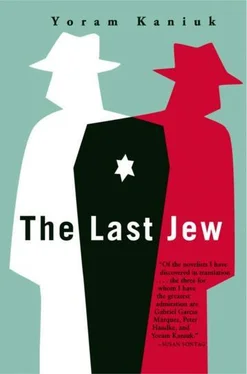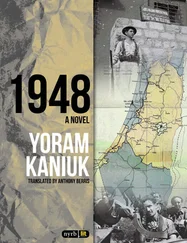For some reason I believed him, there was no pleading in his voice, no asking for forgiveness, no evasion. He said simply what, maybe, he had to say. I looked at the picture of the Shimonis' son, the room disappeared, I no longer saw the people. Our association was total, isolated, and then the German said to Henkin who builds castles in frail air: Ebenezer didn't have daughters, Mr. Henkin, like Samuel Lipker, his adopted son, he sells lampshades that weren't made from his parents!
Something in me revolted, even though I didn't understand the meaning of the words, I was filled with a vague longing to run away. I remember the first time we went to see my son's grave. When I stood at the gate of the cemetery I wanted to flee. As if my son was waiting for me there. I thought about circles; I go outside my room and there is no Giladi, a new neighbor lives there, works a garden, talks about north Tel Aviv, I then investigate the history of the Last Jew, and the Last Jew I investigate is named Ebenezer, why did he ask me for daughters he didn't have? Ebenezer, the one I investigated, didn't have daughters, he had a son, the son's name wasn't Samuel Lipker, what's the connection to Marar, to Boaz Schneerson, to Germanwriter? From what side does the sea die near my house, an old man once asked me on the seashore during an evening stroll, how are you sure that Hitler is dead? Did you see his body? How do you know? Germanwriter is talking and I'm listening to him slowly through my thoughts; they held a meeting for me at the Writers' Union, he said, it was hard, what I saw that morning at Yad Vashem was still echoing in me, not that I ever wanted to forget. They spoke, and something brings you close but nevertheless an accusation was heard in their words, what could I tell them? That I've already spent years investigating the history of the Last Jew, the great-grandson of Secret Charity? No, don't say a word, Mr. Henkin, I know what you do, so I asked to meet you, wait, maybe you don't know or you didn't know that Ebenezer Schneerson is the Last Jew.
Schneerson? I asked and felt my legs growing cold.
Schneerson, he said, your neighbor! Look, Mr. Henkin, I'm so sorry but he doesn't have and didn't have daughters! At that meeting with the writers one writer spoke excitedly; he said: We live in a world where people walk around who at night dream dreams that terrify them, he meant meThis is a land woven of nightmares of two hundred, three hundred thousand people and this venom of theirs is the texture of our life, he said, the foundation of this tribe that stands with a flag in hand under eighty meters of water, and then he said to me: Here's my friend, acquaintance I would say, his name is Boaz Schneerson, he thought he lost his father in an awful disaster, but his father, whom he didn't know at all, returned after forty years, and they don't know one another….
You understand Mr. Henkin, there are a lot of people here, not Ebenezer, not him, who really believed that awful absurdity that I may be able to return their daughters to them, what I really came to do is to return Ebenezer's daughters even though he didn't have any daughters.
I listened, I thought about Boaz, about my neighbor, I tried to believe everything I was hearing, that I wasn't dreaming and indeed I wasn't dreaming, he said those words and I was silent and listened. I tasted the wine I saw in a glass standing nearby; it tasted disgusting but it cooled me. And I sipped the wine again. And the writer said: Ebenezer who's the son of the great-grandson of Secret Charity.
I said scion, I said.
Yes, the son of his great-grandson, he said without listening to me at all, he's waiting for me. In the special language of Samuel Lipker whom you may not know, he asked you, Mr. Henkin, to bring me to him. We should go, ah, this party is starting to weary me.
I poured myself another glass of wine. Jordana came to us and tried to smile, I couldn't respond to her, and the writer said to Jordana: Call Mr. Givon from the Foreign Ministry for me a minute, I want to tell him something, my legs are heavy and I can't get up. She looked at him and I looked in her eyes and they were empty. The man from the Foreign Ministry came and we, two tame dogs, we looked at him and didn't know him. I drank more wine, the Germanwriter also sipped and Mr. Givon, splendidly dressed fitting his position, bowed to us and my neighbor on the sofa said to him: I'm going with Mr. Henkin and Givon said to him, Fine, tomorrow morning at ten we'll come get you. Please don't forget the luncheon with the Foreign Minister…
From my perspective, the German's leg looked like a mountain. I looked at the fold of his trousers, which was sharp and precise, I saw a spear. Beyond the boulevard a light was gleaming and from some hidden window came rhythmical, distant music, I drank more wine until the glass I was holding remained empty and one drop rolled around on the glass and left a delicate trail behind, a small drop of blood, small as a miniature galaxy in the process of final destruction.
When I reconstruct today what happened then, I remember that I was amazed. I started drinking everything that came to hand, from half-empty goblets, from bottles on the table, while the German drank in a more controlled manner, like somebody who's used to drinking, munched roasted peanuts, and then I knew I was drunk. The writer begged pardon and said he had to go to the bathroom a moment, he wandered toward the corridor and I pondered something that had happened long ago, in my childhood. It was the night of the Passover Seder, I drank wine then and went out of the room, I went up to our attic, I found there the piles of my father's books, textbooks, reading books, sex books, forbidden stories including a small booklet titled The Tale of Reb Joseph de la Rayna and His Five Students by Solomon Navarro. The subject of it had a name that was destroyed, and I read it drunk and shocked, and later on, that story is etched so deep in my memory-and that was the one and only time until that evening that I got drunk-until I wrote the first study in the Land of Israel on the case of Joseph de la Rayna. In that story I found some apocalyptic meaning for our enterprise here. For the great spiritual revolt. As I said it was my first study and as far as I know that study of mine preceded many greater scholars than I. And to this day I keep a letter of congratulations from Bialik about that study of mine that was published in 1912. Once in a moment of anger I even called my son Joseph, and when he wanted to know why, I told him the story and back then I didn't have time for my son as I do today, and he, for some reason, copied the story into his notebook and from then on whenever he rebelled-and he rebelled so many times-he'd turn to me with his refreshing and open laugh and say: Henkin, I bring salvation and I ask him, how, by pinching a little girl's behind? And he told me something like: Why don't you say ass, Henkin, why behind or buttocks? And how do you know I don't bring salvation? And I try to explain to him the tragic, pathetic structure of the yearning for revenge the enormous need for salvation, for breakthroughs and breakthroughs, talk about chains, about the sense of impotence toward the creation and the sense of betrayal of the nation but in vain.
Now I could have fun with my real son, not the Menahem Jordana is in love with, not my son that Boaz Schneerson created for me, but the one my wife shaped in her heart, impetuous, loving the sea, and I got up, my head spinning, the teacher Henkin who placed thirty-four generations of students walks like a drunkard, my son is smoking in the shelter, I approached the Shimonis who separated me from the wall opposite, the wall where my features were still stuck between the Bedouin ruin and the etching of Goethe. Gallantly, I took Mrs. Shimoni's pure, wrinkled hand, kissed it, and said to Jordana: Eat a plastic tomato, Jordana, and Mrs. Shimoni looked at me with measured, chilly defiance, she wasn't used to seeing me lose my poise and here I am a fool in her eyes, mischievous, and she tries to formulate something against me, something her son will transmit to my son, that's what we always do, bring our sons not only for the sake of closeness but also for the sake of conflict, listing virtues in our sons they didn't have, blazing up toward the dark death where our sons are cut up for a new fabric, and they're exaggerated there immeasurably and Mrs. Shimoni smiles at me, we're too sad to be vindictive, guardians of sin or judges, only wondering sometimes, and she smiles as if she understood at long last, everybody has his own apostasy, even Obadiah Henkin, and Jordana looks at me, knows me here and knows me in my house, half and halved, smiles an overly professional smile, and Mrs. Shimoni softens, forgives me, that awful need to remain loyal, Jordana glances at her, her hand held out in that same gallantry in which I kissed it, and I go to the wall, maybe, I don't see exactly… Contradictory thoughts in my mind and then the German's handsome wife appeared, introduced herself, a few words of parting were said, hands were shaken with exaggerated fervor, and the writer pressed on me with his outsized body and the wife said, My name's Renate, and I said Obadiah Henkin, he hugged my arm hard but gently and pulled me outside, Jordana tried to get to me, to catch my eye, maybe I saw a laugh on the lips of 'sixty-seven, but it was hard for me to create contact, and we left, Renate walked behind us, the door slammed.
Читать дальше












